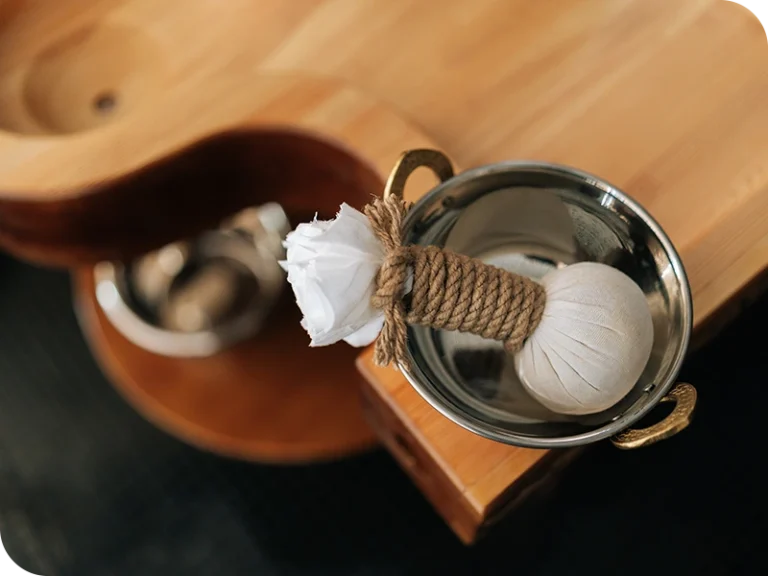Thai oil massage, also known as aromatherapy massage, is a therapeutic practice deeply rooted in ancient Thai healing traditions. This unique form of massage integrates the traditional techniques of Thai massage with the aromatic and therapeutic properties of essential oils, creating a holistic experience that promotes physical, mental, and emotional well-being.
The origins of Thai oil massage can be traced back centuries, drawing on the rich cultural tapestry of Thailand’s history. It is a blend of several ancient healing practices, incorporating elements from Ayurvedic, Chinese, and Southeast Asian medicinal traditions. Ayurvedic practices from India have significantly influenced Thai oil massage, particularly in the use of herbal oils and specific massage techniques aimed at balancing the body’s energies. This connection to Ayurveda is evident in the focus on the body’s energy lines, known as “Sen” in Thai massage, which closely resemble the “Nadis” in Ayurveda.
Chinese medicine has also played a crucial role in shaping Thai oil massage. The Chinese emphasis on acupressure and the flow of “Qi” (life energy) through meridians (energy pathways) is mirrored in Thai oil massage practices. The combination of acupressure and massage strokes in Thai oil massage helps to release blocked energy, improve circulation, and enhance overall vitality.
The incorporation of Southeast Asian medicinal practices further enriches the tradition of Thai oil massage. The use of indigenous herbs and oils, coupled with traditional massage techniques, creates a unique therapeutic experience. Essential oils derived from native plants such as lemongrass, ginger, and eucalyptus are commonly used in Thai oil massage for their healing properties. These oils not only provide a pleasing aroma but also offer various health benefits, including relaxation, pain relief, and improved mood.
Thai oil massage is typically performed on a floor mat, with the recipient wearing loose, comfortable clothing. The therapist uses a combination of gentle stretching, rhythmic compressions, and acupressure along the body’s energy lines. The essential oils are carefully selected to address specific health concerns and are applied with smooth, flowing strokes. The combination of massage techniques and the aromatic benefits of essential oils creates a deeply relaxing and rejuvenating experience.


Thai oil massage offers a multitude of benefits, particularly in the realms of relaxation and stress relief. This therapeutic practice combines the soothing touch of the therapist with the calming properties of essential oils to create a deeply relaxing and rejuvenating experience. The unique integration of traditional Thai massage techniques with aromatherapy provides a holistic approach to wellness, addressing both physical and mental stress.
The process of thai massage london begins with the application of essential oils, chosen for their specific therapeutic properties. These oils, such as lavender, chamomile, and ylang-ylang, are known for their calming and stress-relieving effects. The therapist uses smooth, flowing strokes to apply the oils, allowing their aromas to envelop the recipient and create a tranquil atmosphere. The scent of essential oils plays a crucial role in promoting relaxation by stimulating the olfactory system and triggering the release of neurotransmitters like serotonin and dopamine, which help to elevate mood and reduce anxiety.
The physical aspect of Thai oil massage involves a combination of gentle stretching, rhythmic compressions, and acupressure along the body’s energy lines, or “Sen.” These techniques are designed to release tension from muscles and joints, improve circulation, and enhance the flow of energy throughout the body. The gentle stretching helps to increase flexibility and relieve muscle stiffness, while rhythmic compressions and acupressure stimulate the body’s natural healing processes. This holistic approach not only alleviates physical discomfort but also helps to calm the mind and promote a sense of inner peace.
Stress relief is one of the most significant benefits of Thai oil massage. In today’s fast-paced world, chronic stress has become a common issue, leading to various health problems such as high blood pressure, anxiety, and insomnia. Thai oil massage provides a natural and effective way to combat stress by inducing a state of deep relaxation. The combination of therapeutic touch and the calming effects of essential oils helps to lower cortisol levels, the hormone associated with stress, and promote a sense of well-being. Regular sessions of Thai oil massage can lead to long-term improvements in stress management and overall mental health.
In addition to stress relief, Thai oil massage promotes relaxation by enhancing the body’s parasympathetic nervous system response. This system, also known as the “rest and digest” system, is responsible for promoting relaxation and recovery. By stimulating the parasympathetic nervous system, Thai oil massage helps to reduce heart rate, lower blood pressure, and improve digestion, all of which contribute to a state of deep relaxation.
Thai oil massage is renowned for its effectiveness in relieving muscle tension and alleviating pain. This therapeutic practice combines deep tissue techniques with the application of essential oils, providing a comprehensive approach to addressing muscular issues and chronic pain conditions. The synergy of these elements makes Thai oil massage an ideal choice for those seeking relief from physical discomfort.
The application of essential oils in thai massage london is a fundamental aspect that enhances its therapeutic benefits. Essential oils such as peppermint, eucalyptus, and rosemary are commonly used for their analgesic and anti-inflammatory properties. These oils penetrate the skin, helping to soothe sore muscles and reduce inflammation. The therapist uses smooth, flowing strokes to apply the oils, ensuring they are evenly distributed and deeply absorbed. The aromatic properties of the oils also contribute to relaxation, creating a calming environment that enhances the overall massage experience.
Deep tissue techniques are central to Thai oil massage, targeting the deeper layers of muscle and connective tissue. These techniques involve applying firm pressure and slow strokes to reach areas of tension and knots. By focusing on specific points of pain and stiffness, the therapist can effectively release muscle tension and improve flexibility. The combination of deep tissue massage with essential oils helps to break down adhesions, which are bands of painful, rigid tissue, and promotes better muscle function.
Chronic pain conditions such as back pain, neck pain, and headaches can significantly impact one’s quality of life. Thai oil massage offers a natural and effective way to alleviate these conditions. For back pain, the therapist may use a combination of deep tissue techniques and stretching to release tension in the lower back muscles and improve spinal alignment. The essential oils used can further enhance pain relief by reducing inflammation and promoting relaxation.
Neck pain, often caused by poor posture or stress, can be particularly debilitating. Thai oil massage addresses neck pain by applying targeted pressure to the neck and shoulder areas, releasing tight muscles and improving blood flow. The use of essential oils like lavender and chamomile can also help to relax the neck muscles and reduce tension headaches, which are often associated with neck pain.
Headaches, whether tension-type or migraines, can be effectively managed with thai massage london. The therapist may focus on the head, neck, and shoulder regions, using gentle yet firm pressure to relieve tension and improve circulation. Essential oils such as peppermint and eucalyptus can provide additional relief by reducing pain and promoting relaxation. Regular sessions of Thai oil massage can help to prevent the recurrence of headaches by addressing the underlying muscular issues and stress that often trigger them.


Thai oil massage is highly regarded for its ability to improve circulation, providing numerous health benefits that extend beyond relaxation and stress relief. This therapeutic practice stimulates blood flow and enhances lymphatic drainage, which is essential for maintaining optimal bodily function. The combination of traditional Thai massage techniques with the application of essential oils creates a holistic approach that significantly boosts circulation and promotes overall health.
Improved circulation is one of the primary benefits of thai massage therapy. The massage techniques used in this practice involve rhythmic compressions, deep tissue manipulation, and gentle stretching, all of which are designed to stimulate blood flow throughout the body. As the therapist works on different muscle groups, they apply varying degrees of pressure to encourage the flow of blood to these areas. This increased blood flow delivers oxygen and nutrients to tissues and organs more efficiently, which is crucial for their proper functioning and overall health.
The use of essential oils in Thai oil massage further enhances its circulatory benefits. Oils such as rosemary, ginger, and black pepper are known for their ability to improve blood circulation. When these oils are applied to the skin and massaged into the muscles, they help to dilate blood vessels and reduce any vascular resistance. This process not only promotes better blood flow but also helps to warm up the muscles, making them more pliable and less prone to injury.
Lymphatic drainage is another critical aspect of Thai oil massage. The lymphatic system is responsible for removing metabolic waste products, toxins, and excess fluids from the body. Unlike the circulatory system, the lymphatic system does not have a central pump like the heart to move lymph fluid. Instead, it relies on the movement of muscles and manual manipulation to facilitate its flow. Thai oil massage uses specific techniques to stimulate the lymphatic system, helping to clear blockages and promote the efficient removal of waste products. This process is essential for maintaining a healthy immune system and preventing the buildup of toxins that can lead to inflammation and disease.
Enhanced circulation and lymphatic drainage from Thai oil massage also contribute to the reduction of swelling and oedema. By promoting the movement of blood and lymph fluid, the massage helps to prevent fluid retention and reduce swelling in areas such as the legs, ankles, and hands. This can be particularly beneficial for individuals who suffer from conditions such as lymphedema or chronic venous insufficiency.
The benefits of improved circulation from Thai oil massage extend to the skin as well. Increased blood flow delivers essential nutrients and oxygen to the skin cells, promoting a healthy, radiant complexion. The removal of toxins and metabolic waste through enhanced lymphatic drainage also helps to clear the skin, reducing the occurrence of acne and other skin conditions.
The application of nourishing oils during the massage session helps moisturize the skin, leaving it feeling soft, supple and rejuvenated. Essential oils may also have therapeutic effects on skin conditions.
Thai oil massage is not only a deeply relaxing and therapeutic experience but also a powerful method for nourishing and hydrating the skin. By utilizing a variety of essential oils, this massage technique helps to moisturize the skin, leaving it soft, supple, and rejuvenated. The benefits extend beyond hydration, as the essential oils used in Thai oil massage can also have therapeutic effects on various skin conditions, promoting overall skin health.
During a thai massage london session, the therapist applies a blend of essential oils tailored to the individual’s needs. These oils, such as coconut, jojoba, and almond, are renowned for their moisturizing properties. Coconut oil, for instance, is rich in fatty acids that deeply penetrate the skin, providing long-lasting hydration. Jojoba oil closely resembles the skin’s natural sebum, making it an excellent moisturizer that helps balance oil production. Almond oil is rich in vitamins E and A, which nourish the skin and promote a healthy complexion.
The process of massaging these oils into the skin helps to enhance their absorption, ensuring that the skin receives maximum benefits. As the therapist works the oils into the skin with gentle, rhythmic strokes, the oils penetrate deeply into the dermal layers. This not only hydrates the skin but also helps to lock in moisture, creating a protective barrier that prevents dryness and dehydration. The result is skin that feels incredibly soft and smooth, with a noticeable improvement in texture and tone.
In addition to providing hydration, the essential oils used in Thai oil massage have various therapeutic properties that can benefit the skin. For example, tea tree oil is known for its antimicrobial and anti-inflammatory properties, making it effective in treating acne and other skin irritations. Lavender oil has soothing properties that can help calm sensitive or irritated skin, reducing redness and promoting healing. Rosehip oil is rich in antioxidants and essential fatty acids, which help to repair damaged skin and reduce the appearance of scars and fine lines.
The regular application of these nourishing oils during Thai oil massage sessions can significantly improve skin health over time. The increased hydration and nourishment provided by the oils help to strengthen the skin’s natural barrier, making it more resilient to environmental stressors such as pollution and harsh weather. This enhanced resilience helps to prevent common skin issues like dryness, flakiness, and irritation, keeping the skin looking youthful and vibrant.


Thai oil massage is a holistic therapeutic practice that not only relaxes the body and mind but also enhances the flow of vital energy, known as prana or chi. By targeting specific pressure points and incorporating deep stretches, Thai oil massage clears blockages in the body’s energy pathways, or “sen lines,” restoring balance and vitality. This ancient technique, rooted in traditional Thai medicine, offers profound benefits for both physical and energetic well-being.
The concept of energy flow is central to many traditional healing practices, including Thai oil massage. According to Thai healing traditions, the body contains a network of sen lines, which are similar to the meridians in Chinese medicine and the nadis in Ayurvedic medicine. These lines are believed to carry vital energy throughout the body, and when they become blocked or disrupted, it can lead to physical and emotional imbalances. Thai oil massage aims to clear these blockages, ensuring the free flow of energy and promoting overall health.
During a Thai oil massage session, the therapist applies gentle yet firm pressure to specific points along the same lines. This targeted pressure helps to release tension and break up any energy blockages that may be present. Essential oils, chosen for their therapeutic properties, are used to enhance the massage, allowing the therapist to work deeply into the muscles and energy lines. Oils such as eucalyptus, lemongrass, and lavender are commonly used for their ability to relax the muscles and open up the energy pathways.
The incorporation of stretching techniques in Thai oil massage further aids in enhancing energy flow. The therapist guides the recipient through a series of assisted stretches that are designed to open up the body and improve flexibility. These stretches not only help to release physical tension but also stimulate the sen lines, encouraging the movement of energy throughout the body. The combination of pressure and stretching creates a dynamic flow of energy that revitalizes the body and mind.
One of the key benefits of enhancing energy flow through Thai oil massage is the restoration of balance and harmony within the body. When energy flows freely, it nourishes the organs and tissues, supporting their optimal function. This can lead to improved digestion, better circulation, and a strengthened immune system. By addressing energy blockages, Thai oil massage helps to prevent illness and promote a sense of overall well-being.
Additionally, the enhanced energy flow achieved through Thai oil massage can have a profound impact on mental and emotional health. Blockages in the sen lines are often associated with feelings of stress, anxiety, and emotional stagnation. By clearing these blockages, Thai oil massage helps to release stored emotions and promote a sense of mental clarity and calm. Recipients often report feeling lighter, more energized, and emotionally balanced after a session.
Thai oil massage is a unique and holistic therapeutic practice that combines traditional Thai massage techniques with the aromatic and healing properties of essential oils. This massage therapy focuses on balancing energy, alleviating muscle tension, and promoting overall well-being through a comprehensive approach that targets both the body and mind.
At the core of Thai oil massage are its principles, which draw from ancient Thai healing traditions. The primary aim is to restore the natural flow of energy within the body, which is believed to travel along specific pathways known as “sen lines.” These lines are analogous to meridians in Chinese medicine and nadis in Ayurvedic medicine. Blockages or disruptions in these energy pathways can lead to physical discomfort and emotional imbalances. Thai oil massage seeks to clear these blockages, ensuring a harmonious flow of energy.
The massage therapist begins by applying a blend of essential oils to the skin. These oils are chosen for their therapeutic properties and may include lavender for relaxation, eucalyptus for respiratory health, or ginger for its warming effects. The oils not only enhance the physical benefits of the massage but also provide aromatic benefits that can soothe the mind and enhance the overall experience.
The holistic approach of Thai oil massage extends beyond physical relaxation. The combination of massage techniques and essential oils also provides significant mental and emotional benefits. The soothing aroma of the essential oils, combined with the therapeutic touch of the massage, helps to reduce stress, anxiety, and mental fatigue. This creates a sense of inner peace and well-being that lasts long after the massage session.
Thai oil massage is also effective in alleviating muscle tension and promoting overall health. By improving circulation and lymphatic drainage, it helps to deliver oxygen and nutrients to the tissues, remove toxins, and support the body’s natural healing processes. This can lead to improved energy levels, enhanced immune function, and a general sense of vitality.

